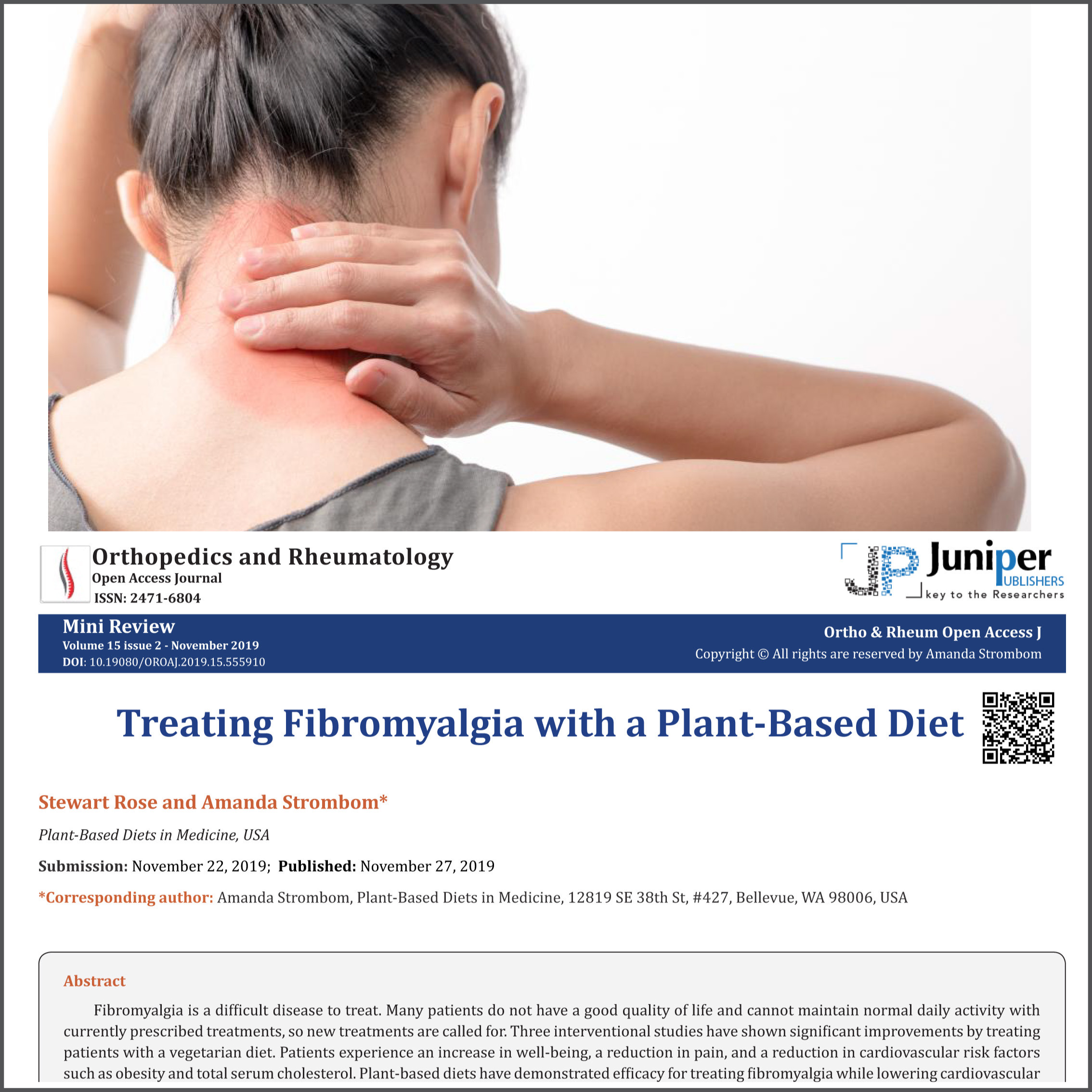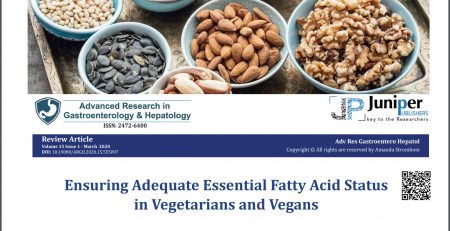The Treatment of Fibromyalgia with a Plant-Based Diet
This article was published in Orthopedics and Rheumatology Open Access Journal
Abstract
Fibromyalgia is a difficult disease to treat. Many patients do not have a good quality of life and cannot maintain normal daily activity with currently prescribed treatments, so new treatments are called for.
Three interventional studies have shown significant improvements by treating patients with a vegetarian diet. Patients experience an increase in well-being, a reduction in pain, and a reduction in cardiovascular risk factors such as obesity and total serum cholesterol.
Plant-based diets have demonstrated efficacy for treating fibromyalgia while lowering cardiovascular risk factors and reducing exacerbating factors such high BMI and common comorbidities. Often the efficacy is as good and, in some cases, better than standard treatment. The plant-based diet has the advantage of having no side effects and no contraindications. This allows it to be easily integrated with other treatments.
Citation for this article: Rose S, Strombom A. Treating fibromyalgia with a plant-based diet. Ortho & Rheum Open Access J. 2019 15(2):555910
Introduction
As the physician will already know, fibromyalgia is a disease which is often very difficult to treat. Fully efficacious treatments for fibromyalgia remain elusive which can be frustrating for both the patient and the clinician. (1) These patients do not have a good quality of life and cannot maintain normal daily activity with currently prescribed treatments. Hence, many fibromyalgia patients inquire about dietary interventions. (2)
Among the different hypotheses for its etiologic pathophysiology, oxidative stress has been suggested as one of the possibilities. (2) In fact, recent studies have shown some evidences demonstrating that oxidative stress is associated with clinical symptoms in fibromyalgia patients. (3, 4) High oxidative stress is associated with neuropathic and muscle pain in fibromyalgia patients. (5) It therefore makes sense for vegetarian diets to have some beneficial effects, probably due to the increase in antioxidant intake. (2, 3)
Interventional Studies
Three interventional studies have shown significant improvements from treating patients with a vegetarian diet:
An interventional study on the effect of a vegetarian diet on fibromyalgia patients showed a significant decrease in serum peroxides indicating an improved antioxidant status. The results also showed that a vegetarian diet had a significantly beneficial effect on plasma fibrinogen concentration, and on the serum levels of several lipoprotein-related coronary risk factors. Most importantly, 70% of patients reported increased well-being and reduced pain. (6) Also important was the improvement in cardiovascular risk factors, considering that a recent study showed that fibromyalgia patients have double the risk of coronary artery disease. (7)
A 7-month long interventional study of treating fibromyalgia with a vegetarian diet yielded significant results. The mean fibromyalgia impact questionnaire (FIQ) score decreased 46%. Significant improvements were seen in shoulder pain at rest and after motion, abduction range of motion of shoulder, flexibility, chair test, and 6-minute walk. At 7 months, responders’ Quality of Life scores for all scales except bodily pain were no longer statistically different from the norms for adults aged 45-54. (8)
A 3-month interventional study with a plant-based diet resulted in significant improvements in visual analogue scale of pain, joint stiffness, quality of sleep, Health assessment questionnaire, General health questionnaire, and a rheumatologist’s own questionnaire. Overweight patients experienced a significant reduction in body mass index and in total serum cholesterol. (9)
Discussion
The plant-based diet has the advantage of having no side effects and no contraindications. This allows it to be easily integrated with other treatments. It also safe in the long term, which is very important since fibromyalgia is considered incurable. At least one of its mechanisms of action appears to be its antioxidant action, but there are likely to be others as well that should be researched.
Lifestyle treatments such as increased exercise and sleep hygiene are already recommended to most patients, along with cognitive behavioral therapy. The therapeutic use of a plant-based diet fits right in with these recommendations. Patients should be advised that it will take a couple of months until the full effects of the diet are made evident.
References
|
1. |
Okifuji A, Gao J, Bokat C, Hare B. (2016) Management of fibromyalgia syndrome in 2016. Pain Management. 6(4):383-400. |
|
2. |
Arranz L, Canela M, Rafecas M. (2010) Fibromyalgia and nutrition, what do we know? Rhematology International. 30(11):1417-27. |
|
3. |
Russell I, Jon X, Yangming H, et al. (2009) Serum Hydrogen Peroxide Levels Are Elevated in Fibromyalgia Syndrome. Arthritis and Rheumatism. 60 Suppl 10:92. |
|
4. |
Cordero M, Cano-García F, Alcocer-Gómez E, et al. (2012) Oxidative stress correlates with headache symptoms in fibromyalgia: coenzyme Q₁₀ effect on clinical improvement. PLoS One. 7(4):e35677. |
|
5. |
Cordero M, de Miguel M, Sánchez Alcázar J. (2012) The Role of Oxidative Stress and Mitochondrial Dysfunction in the Pathogenesis of Fibromyalgia. In: Wilke WS, ed. New Insights into Fibromyalgia. Vol Chapter 5: InTech. |
|
6. |
Høstmark A, Lystad E, Vellar O, et.al. (1993) Reduced plasma fibrinogen, serum peroxides, lipids, and apolipoproteins after a 3-week vegetarian diet. Plant Foods for Human Nutrition. 43(1):55-61. |
|
7. |
Tsai P, Fan Y, Huang C. (2015) Fibromyalgia is associated with coronary heart disease: a population-based cohort study. Regional Anesthesia and Pain Medicine. 40(1):37-42. |
|
8. |
Donaldson M, Speight N, Loomis S. (2001) Fibromyalgia syndrome improved using a mostly raw vegetarian diet: an observational study. BMC Complementary Alternative Medicine. 1:7. |
|
9. |
Kaartinen K, Lammi K, Hypen M. (2000) Vegan diet alleviates fibromyalgia symptoms. Scandinavian Journal of Rheumatology. 29(5):308-13. |












